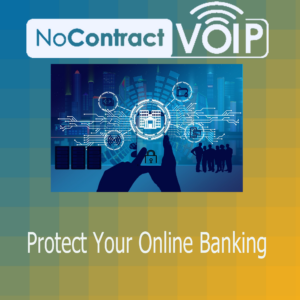How To Secure Online Banking

Approximately 73% of people around the world use some form of online banking at least once a month, indicating that people now have unprecedentedly convenient account access. However, such convenience can come at a cost.
In 2021, banking-related cybercrime saw a significant increase with account takeover fraud rising by 90% and new account fraud jumping a staggering 109%. This increase in cybercrime has been attributed to the increased ease of online banking.
If a hacker breaches your bank account, it can be devastating and may result in significant losses that you may not be able to recoup from your financial institution. In contrast, while a breached Facebook account which can be a real pain, it usually doesn’t lead to felony theft charges.
To help secure your bank account, we took a look at the mistakes people make leaving their accounts at risk. We also came up with some important tips on how to keep your bank account better protected.
Mistakes Allowing Criminals to Access Your Account
Avoiding Two-factor Authentication
Two-factor authentication (2FA) packs a big punch and is a simple process. Enabling this setting in an online account requires an extra step to gain access, which usually involves receiving a one-time passcode (OTP) by SMS and entering it at login.
Many people mistakenly leave this setting disabled because they either don’t know it’s available or think it’s too inconvenient. However, leaving this setting off makes it much easier for a bad actor to breach your account.
Falling for a Phishing Scam
Cyber criminals use several types of phishing scams to target online banking. They send emails that resemble those from your bank, even promising incredibly low rates on credit cards to trick you.
Another scam involves warning you of unauthorized account activity, prompting you to click a link to log in. However, this link takes you to a fake page designed to look like your bank’s normal website.
These are just a few ways scammers can obtain your online banking login details, which they will use immediately to get whatever they can.
Using Easy-to-Guess Passwords
If your account password is easy to remember, it’s usually also easy to guess. Using weak passwords enables many cyber criminals.
Some best practices for passwords include:
- Make them at least 10 characters long
- Include at least one number
- Enter at least one symbol
- Use at least one upper-case letter
- Don’t make them personal (e.g., don’t use your birthdate, etc.)
Our favorite method is to use the initials of a longer mnemonic phrase, with sensible substitutions like @ for a and 0 (zero) for the letter o.
Downloading Unsafe Mobile Apps
Malicious mobile apps often hide banking trojans, which can be disguised as something as innocent as a task manager. Once installed, the trojans search for any details they can find, specifically targeting banking and wallet apps.
Logging Into Online Banking While on Public Wi-Fi
Logging into online banking while on public Wi-Fi (such as at a fast food restaurant) is a surefire way to give away your password. Hackers frequently monitor the activity of others on public hotspots. They can sit two tables away and nobody will notice them. You should avoid typing in any sensitive details or passwords when connected to public Wi-Fi.
Tips for Improving Online Banking Security
Turn On Two-Factor Authentication
Enabling two-factor authentication, also known as multi-factor authentication or two-step verification, in your online banking account can block 99.9% of fraudulent login attempts, according to Microsoft.
Set Up Banking Alerts
When an intruder breaches your account, time is of the essence. The quicker you notify your bank of the breach, the better, as it can reduce the impact on you by locking down your account immediately.
To facilitate swift notification, set up banking alerts, such as low-balance alerts and login alerts, through your online banking.
Install an Antivirus & DNS Filtering On Your PC & Mobile Device
Having reliable antivirus software on both your PC and mobile device is essential. Despite shopping online and banking via mobile devices, many people neglect to protect their phones in this way.
Using a DNS filter is also beneficial, as it blocks dangerous phishing sites, protecting you from potential harm.
Take Phishing Training Classes
You can reduce your vulnerability to phishing scams by taking phishing awareness classes, which can teach you how to identify phishing and stay up-to-date on the newest scams. Many of these classes are available online for free. Additionally, you can contact us for more personalized training options.
Having the ability to recognize phishing attempts through text, email, and phone can help you avoid falling victim to these scams.
Why Is This Published By A Business Phone Company?
Here at NoContractVoIP, we believe that your success creates our success. And, since we specialize in business communication, we work to help you communicate better while staying safe. We create the cutting edge communication systems that modern companies need.
To talk to a business phone system specialist, call 866-550-0005 or contact us today.
To get the latest helpful content delivered to your inbox every month, subscribe to our newsletter here.
